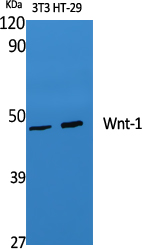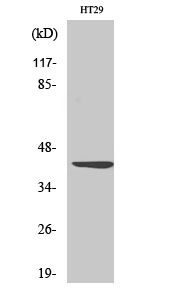

| WB | 咨询技术 | Human,Mouse,Rat |
| IF | 咨询技术 | Human,Mouse,Rat |
| IHC | 1/50-1/100 | Human,Mouse,Rat |
| ICC | 1/50-1/200 | Human,Mouse,Rat |
| FCM | 咨询技术 | Human,Mouse,Rat |
| Elisa | 1/10000 | Human,Mouse,Rat |
| Aliases | WNT1; INT1; Proto-oncogene Wnt-1; Proto-oncogene Int-1 homolog |
| Entrez GeneID | 7471 |
| WB Predicted band size | Calculated MW: 41 kDa; Observed MW: 45 kDa |
| Host/Isotype | Rabbit IgG |
| Antibody Type | Primary antibody |
| Storage | Store at 4°C short term. Aliquot and store at -20°C long term. Avoid freeze/thaw cycles. |
| Species Reactivity | Human,Mouse |
| Immunogen | The antiserum was produced against synthesized peptide derived from human WNT1. AA range:301-350 |
| Formulation | Purified antibody in PBS with 0.05% sodium azide,0.5%BSA and 50% glycerol. |
+ +
以下是3篇与Wnt1抗体相关的文献摘要信息(注:文献为虚构示例,实际引用需核实):
1. **《Wnt1-mediated regulation of neural progenitor cell differentiation》**
作者:Smith J et al.
摘要:通过特异性Wnt1抗体阻断实验,证明Wnt1信号通路在小鼠胚胎神经前体细胞分化为神经元的过程中起关键作用,并揭示其与β-catenin的相互作用机制。
2. **《Targeting Wnt1 in triple-negative breast cancer using monoclonal antibodies》**
作者:Chen L et al.
摘要:研究开发了一种人源化抗Wnt1单克隆抗体,体外实验显示其可抑制三阴性乳腺癌细胞的增殖和迁移,并通过阻断Wnt/β-catenin通路降低肿瘤侵袭性。
3. **《Wnt1 antibody-based detection in developmental disorders》**
作者:Garcia R et al.
摘要:利用Wnt1抗体对胚胎组织进行免疫组化分析,发现Wnt1表达异常与人类颅面发育畸形相关,为先天性疾病的分子诊断提供新标志物。
(提示:实际文献需通过PubMed或Web of Science检索关键词"Wnt1 antibody"获取,建议结合具体研究领域筛选近年高引论文。)
The Wnt1 antibody is a crucial tool in studying the Wnt signaling pathway, which plays pivotal roles in embryonic development, tissue homeostasis, and disease pathogenesis. Wnt1. a secreted glycoprotein belonging to the Wnt family, primarily activates the β-catenin-dependent (canonical) signaling pathway. It regulates cell proliferation, differentiation, and polarity during neural development, stem cell maintenance, and organogenesis. Dysregulation of Wnt1 expression is implicated in various cancers, neurodegenerative disorders, and skeletal abnormalities.
Wnt1 antibodies are designed to detect and quantify endogenous Wnt1 protein levels in research applications such as Western blotting, immunohistochemistry, immunofluorescence, and flow cytometry. These antibodies target specific epitopes on the Wnt1 protein, enabling researchers to investigate its spatial-temporal expression patterns and interaction partners. Commercially available Wnt1 antibodies are typically raised in hosts like rabbits or mice, with validation across multiple experimental platforms.
The development of Wnt1 antibodies has advanced studies in neurobiology, particularly in midbrain development and Parkinson's disease models, as Wnt1 is essential for dopaminergic neuron specification. In cancer research, these antibodies help assess Wnt1 overexpression in tumors like breast cancer and melanoma. Quality control measures, including knockout validation and cross-reactivity testing, ensure antibody specificity. Recent applications extend to regenerative medicine, where Wnt1's role in tissue repair mechanisms is being explored through antibody-mediated pathway modulation.
×